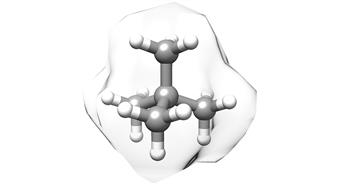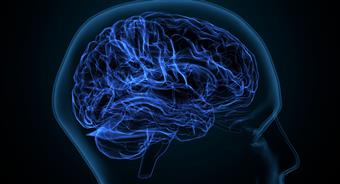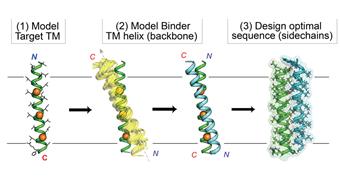
PTSD study identifies potential target for memory disruption
June 19, 2019
JUPITER, FL Fight or flight, panic, trembling: Our brains are wired to ensure we respond instantly to fear. While that fear response may save our lives in the dangerous moment, at times people stay on high alert long after the threat has passed, and develop post-traumatic stress disorder.
A new study from Scripps Research suggests it may be possible to disarm the emotional memories of trauma that drive PTSD symptoms by targeting a molecule found elevated within the brain's emotional memory processor, the amygdala. The research also may offer a novel biomarker for treatment.
Writing in the journal Molecular Psychiatry, Scripps Research neuroscientist Courtney Miller, PhD, and her team describe mir-135b-5p, a microRNA in the basolateral amygdala complex, where long-term memories of fear reside. They found the microRNA altered in both stress-conditioned mice and in military veterans who had been diagnosed with PTSD following deployment in Afghanistan.
There are limited options for people with PTSD, Miller says. We asked whether we could identify something unique to the storage of traumatic memories to get at the heart of the problem.
About 10 percent of women and 4 percent of men will experience post-traumatic stress disorder at some point in their lives, putting them at risk for depression and drug addiction, with rates even higher in the military. An estimated 8 million people a year in the United States cope with the disorder. Sleep, thinking, relationships and jobs frequently suffer.
The main medications used to treat PTSD are selective serotonin reuptake inhibitors, or SSRIs. They can help symptoms, but for many, they don't help enough, Miller says. There's nothing available that targets the traumatic memories themselves.
In prior work, Miller has developed a potential drug that disrupts long-term methamphetamine-associated emotional memories as a strategy for prevention of relapse in drug addiction. That success convinced her that it might also be possible to disrupt long-term emotional memories specific to PTSD.
Within cells, microRNA molecules serve to regulate how genes are expressed. More than 2,000 different types of microRNAs have been identified recently. Discoveries from Scripps Research and elsewhere have shown it's possible to design drug molecules to regulate them as a way of treating diseases once thought undruggable.
We chose to focus on microRNAs because of their ability to titrate the expression of many molecules involved in memory, not just one, and we focused on microRNAs expressed specifically under conditions of stress susceptibility to avoid wiping out people's memories in general, Miller explains.
Her group worked first with stress-conditioned mice to identify microRNA unique to those who appeared permanently changed by their stress exposure. The mouse research revealed mir-135b-5p as a key differentiator between stressed and resilient mice. Next, they exposed mice to stress conditioning and then silenced mir-135b-5p. Those without the microRNA proved uncommonly resilient.
Working with brain tissue samples from the Harvard Medical School Department of Psychiatry, Miller's group found that the microRNA was also conserved from mouse to humans. Next, they identified a consortium in the Netherlands that had collected blood samples six months after Dutch military veterans had served in Afghanistan conflict zones for four-month tours. Some had been diagnosed with PTSD.
In the serum from the PTSD group, they likewise found selective elevation of mir-135b's passenger strand.
Looking ahead, Miller wants to explore how time course may affect response to treatment, and how gender differences may involve alternate traumatic memory storage mechanisms. The data from mice suggested a different mechanism was at work in the females, she says.
I'm excited about the potential of this as a therapeutic target, Miller says. The passenger strand may be a biomarker of responsivity to a mir-135-based therapeutic.
In addition to Miller, the authors of MicroRNA regulation of persistent stress-enhanced Memory, published online May 29, 2019 in the journal Molecular Psychiatry, are: First author Stephanie Sillivan, Sarah Jamieson, Megan Jones, Nadine Joseph and Gavin Rumbaugh of Scripps Research; Laurence de Nijs, Clara Snijders, Bart Rutten, Julian Krauskopf and Jos Kleinjans of Maastricht University in The Netherlands; Torsten Klengel and Kerry Ressler of the Harvard Medical School Department of Psychiatry; Christiaan Vinkers, Marco Boks, Elbert Geuze and Eric Vermetten of the University Medical Center Utrecht Department of Psychiatry Rudolf Mangus Brain Center in The Netherlands.
The work was funded by grants from the National Institute of Mental Health MH105400 and MH105400-02 (Diversity Supplement) (CM), National Institute of Neurological Disorders and Stroke NS096833 (CM), National Institute on Drug Abuse DA041469 (SS) and the Brain and Behavior FoundationNARSAD Young Investigator Award (SS). This research project was also supported in part by the Viral Vector Core of the Emory Neuroscience National Institute of Neurological Disorders and Stroke Core Facilities grant, P30NS055077. LdN and smRNA-Seq experiments in human serum were funded by a VIDI award number 91718336 from the Netherlands Scienti c Organization (BR) and the European Union's Horizon 2020 research and innovation program under the Marie Sk odowska-Curie grant agreement No. 707362 (LDN).
Neurological Disorders Molecular Medicine Miller, Courtney
More from Scripps
20/04/2024
New copper-catalyzed C-H activation strategy from Scripps Research Two-mode reactions inspired by human detox enzymes offer powerful new tools for drug discover...
12/04/2024
Scripps Research chemists devise easier new method for making a common type of building block for drugs Scientists transform simple linear amines into saturated...
06/04/2024
A simple, inexpensive way to make carbon atoms bind together A Scripps Research team uncovers a cost-effective method for producing quaternary carbon molecules,...
04/04/2024
Developing a vaccine for the zombie drug xylazine Scripps Research chemical biologists design an early proof-of-concept vaccine that could lead to the first...
30/03/2024
How blocking a neural receptor responsible for addiction could reduce alcohol use A Scripps Research team found that a new therapeutic that targets the kappa op...
13/03/2024
New computational strategy boosts the ability of drug designers to target proteins inside the membrane Customized-design approach could streamline the design of...
29/02/2024
Scripps Research scientists reveal how first cells could have formed on Earth New phospholipid discovery brings researchers closer to understanding how primordi...
29/02/2024
How molecular handedness emerged in early biology Scripps Research chemists fill a major gap in origin-of-life theories.
February 28, 2024
LA JOLLA, CA Mole...
22/02/2024
Snaking toward a universal antivenom Scripps Research scientists discovered antibodies that protect against a host of lethal snake venoms.
February 21, 2024
...
06/02/2024
Calibr-Skaggs announces expansion of option and license agreement with AbbVie to develop novel cell therapies for solid tumors and autoimmune diseases
AbbVie...
26/01/2024
Re-energizing mitochondria to treat Alzheimer's disease Scripps Research team restored neuron-to-neuron connections in human cells.
January 25, 2024
LA JO...
24/01/2024
100 years of Science Changing Life: Scripps Research celebrates a century of transforming human health For the last century, institute leaders and renowned scie...
23/01/2024
New technology lets researchers track brain cells' off switches The method could shed light on what goes awry in numerous brain conditions when neurons ar...
09/01/2024
Three decades of giving: Announcing the Calibr-Skaggs Institute for Innovative Medicines The ALSAM Foundation, founded by the Skaggs family, provides lasting g...
04/01/2024
Life science entrepreneur Gene Lay joins Scripps Research Board of Directors Lay, founder of the global biotech company BioLegend, brings invaluable experience ...
21/12/2023
Taming a plant-derived toxin Scripps Research team modifies the traditional poison picrotoxinin for potential neurological drugs and anti-parasite treatments. ...
19/12/2023
Scripps Research Executive Vice President Eric Topol gives TED talk on transformative power of AI in medicine Topol provides an overview of how AI models can i...
13/12/2023
New AI-powered algorithm could better assess people's risk of common heart condition Early detection of atrial fibrillation can reduce the risk of stroke an...
07/12/2023
Nanoparticle flu vaccine design shows promise in early tests Scripps Research-designed vaccine could provide broad, enduring protection against influenza A str...
16/11/2023
Numerous Scripps Research scientists named Highly Cited Researchers Clarivate's annual, global list represents researchers who have demonstrated significant...
07/11/2023
Multiple sclerosis drug invented at Scripps Research slows long-term devastating disease progression Late-breaking data reinforces the effectiveness and safety ...
05/10/2023
Keren Lasker named a 2023 Moore Inventor Fellow The prestigious award will support Lasker's inventive research in membraneless organelles and their applica...
22/09/2023
Michael Bollong named a 2023 Amgen Young Investigator The prestigious award will support Bollong's research identifying new molecular targets and therapeuti...
09/09/2023
Philip Dawson receives 2024 American Chemical Society National Award Dawson is honored with the Arthur C. Cope Late Careers Scholar Award for his foundational c...
07/09/2023
Scripps Research chemists devise a method for C-H activation of alcohols The method represents a new toolkit for making drugs and other compounds.
September 06...
31/08/2023
Scripps Research receives $1.5M to surveil infectious disease threats in wastewater Bill & Melinda Gates Foundation award to support the development of multi-pa...
16/08/2023
How cold temperatures trigger the brain to boost appetite Scripps Research scientists' discovery could lead to new weight loss and metabolic health treatmen...
08/08/2023
Human antibody that targets carfentanil, fentanyl and related opioids reverses overdose effects in preclinical study Scripps Research-developed antibody therapy...
04/08/2023
How sensory neurons impact the gut Scripps Research scientists show that the receptor PIEZO2 in sensory neurons controls gut motility and transit time, which a...
26/07/2023
AbbVie and Calibr Expand Strategic Collaboration to Advance Several Preclinical and Early-stage Clinical Assets The expanded strategic collaboration will advan...
23/07/2023
Scripps Research scientists develop AI-based tracking and early-warning system for viral pandemics Machine-learning system effectively predicts emergence of pro...
19/07/2023
Monitoring T cells may allow prevention of type 1 diabetes Scripps Research study shows that analyzing T cells in blood samples could be used to select at-risk ...
19/07/2023
Scripps Research mourns passing of leading organic chemist Albert Eschenmoser Eschenmoser pioneered key reactions in synthetic chemistry and shaped the understa...
15/06/2023
Scripps Research awarded $46.8 million by NIH to promote human health through innovative translational science and training The Translational Institute is harne...
13/06/2023
Scripps Research's Danielle Grotjahn named 2023 Pew Scholar in the Biomedical Sciences The award will support Grotjahn's study of how cells assemble the...
31/05/2023
Crossing the ring: new method enables C-H activation across saturated carbocycles Scripps Research chemists add another powerful tool to their molecular editin...
24/05/2023
Scripps Research develops behind-the-scenes tool for better biomedical data discovery The new resource makes datasets more discoverable for life science communi...
19/05/2023
Scripps Research neuroscientist Hollis Cline elected to American Academy of Arts and Sciences Cline is recognized for her discoveries about the role of sensory ...
19/05/2023
Scripps Research's Skaggs Graduate School awards doctoral degrees to 31st graduating class Commencement ceremony will be livestreamed via Zoom and on instit...
13/05/2023
A better route to benzocyclobutenes, sought-after building blocks for drugs Scripps Research chemists devise a new, C-H activation-based method for the synthesi...
09/05/2023
Renowned Scripps Research professor Jeffery Kelly elected to National Academy of Sciences Kelly's groundbreaking work on protein misfolding has led to thera...
28/04/2023
Mirror-image molecules pave new path for cancer drug discovery By comparing how mirror image versions of small molecules impact clusters of proteins, Scripps R...
22/04/2023
How alcohol consumption contributes to chronic pain A Scripps Research team showed how both alcohol intake and alcohol withdrawal can lead to increased pain and...
21/04/2023
Xin Jin receives dual awards to study autism risk genes in neurodevelopment Major grants from the National Institutes of Health and California Institute for Reg...
20/04/2023
Trim the sugar: New HIV vaccine design improves immune response Scripps Research vaccine candidate headed for clinical trials.
April 19, 2023
LA JOLLA, CA A...
18/04/2023
Therapeutic can seek and destroy potent opioid to treat overdoses Scripps Research chemists developed a new biologic to work against the synthetic opioid carfen...
07/03/2023
How heavy alcohol consumption increases brain inflammation The findings by a Scripps Research team point toward a potential new drug target for treating alcohol...
02/03/2023
Scientists find human antibodies that can block multiple coronaviruses including SARS-CoV-2 Results from a Scripps Research and UNC team pave the way for a vacc...
28/02/2023
$10 million grant funds Scripps Research Alcohol Research Center through its 50th year The five-year grant supports research into the neurobiology of alcohol us...
28/02/2023
Immune system drug shows promise in treating alcohol use disorder, a Scripps Research clinical trial reports Scientists at Scripps Research found that apremilas...
 PTSD study identifies potential target for memory disruption
PTSD study identifies potential target for memory disruption 























